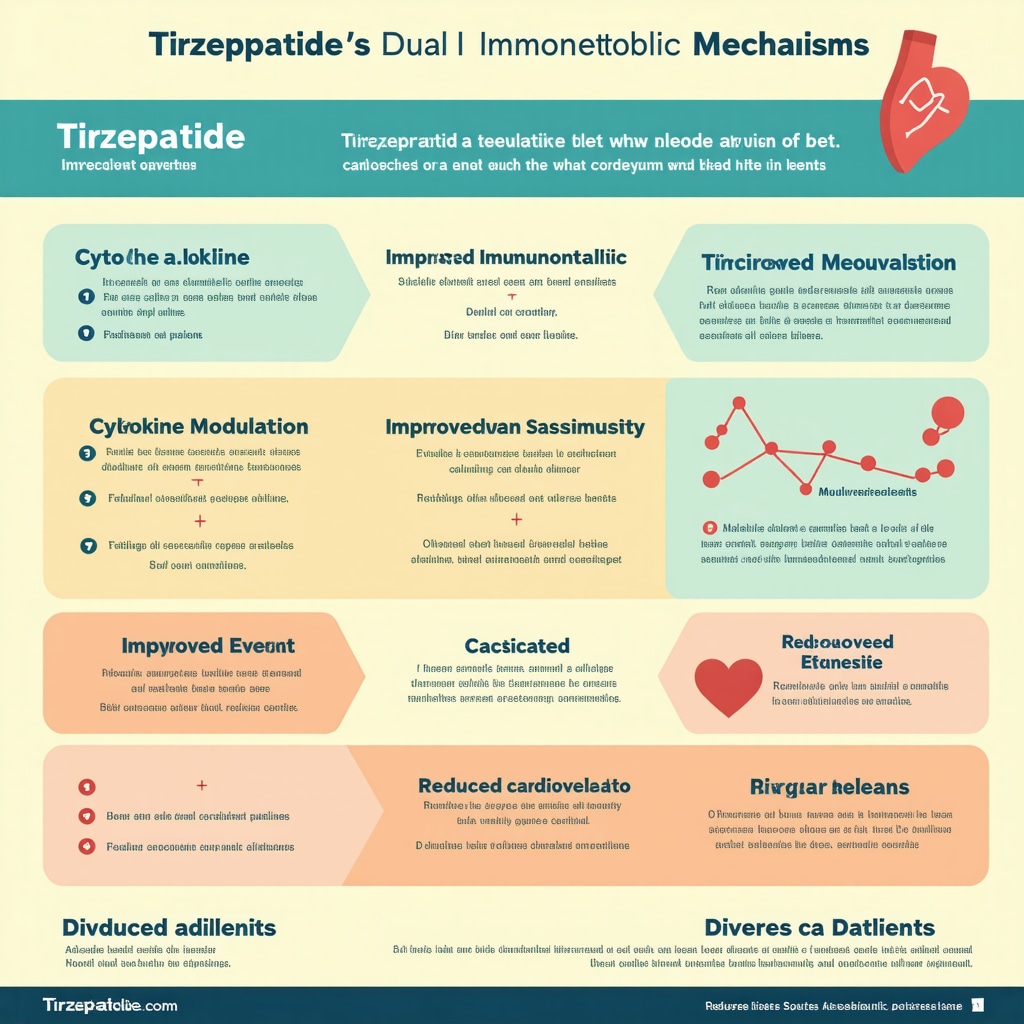Revolutionizing Weight Management: The Rise of Tirzepatide in New Jersey
In the evolving landscape of obesity medicine, GLP-1 agonists have emerged as transformative agents for weight loss and metabolic health. Among these, Tirzepatide stands out prominently, captivating the attention of healthcare providers and patients alike in New Jersey. But what exactly makes Tirzepatide the leading choice for GLP-1 agonist therapy today? Delving into its unique pharmacological profile, clinical efficacy, and patient-centered benefits reveals a compelling narrative of innovation and hope for effective weight management.
Dual Hormone Action: The Science Behind Tirzepatide’s Superior Efficacy
Tirzepatide is a novel dual glucose-dependent insulinotropic polypeptide (GIP) and glucagon-like peptide-1 (GLP-1) receptor agonist. This dual agonism differentiates it from traditional GLP-1 agonists, enhancing insulin secretion, reducing appetite, and improving glycemic control synergistically. Such a mechanism creates a multifaceted approach to weight loss and diabetes management, which has been substantiated in rigorous clinical trials demonstrating significant and sustained weight reduction.
How Does Tirzepatide Compare to Other GLP-1 Agonists in NJ Weight Loss Clinics?
Patients and practitioners in New Jersey often ask how Tirzepatide stacks up against other GLP-1 agonists like semaglutide or liraglutide. The answer lies in its enhanced weight loss outcomes and metabolic benefits. Studies published in the New England Journal of Medicine report that Tirzepatide produces greater average weight loss at various dose levels compared to its counterparts. This superior efficacy translates into improved patient satisfaction and adherence in physician-supervised weight loss programs across New Jersey.
Patient Experience in NJ: Personalized Care and Sustainable Results
Beyond the pharmacodynamics, the lived experiences of patients undergoing Tirzepatide treatment in New Jersey clinics underscore its value. Many report not only significant weight loss but also enhanced energy levels and better control over cravings, contributing to sustainable lifestyle changes. Physician-supervised programs integrate Tirzepatide with nutritional guidance and behavioral support, tailoring treatment plans to individual needs for optimal outcomes. This comprehensive approach is a cornerstone of the successful weight loss journeys documented in real patient stories.
Beyond Weight Loss: The Broader Metabolic Benefits Captivating NJ Specialists
While weight loss is the headline benefit, Tirzepatide’s effects extend to improved cardiovascular markers, lipid profiles, and glycemic control, addressing the complex metabolic syndrome often accompanying obesity. This holistic impact is particularly relevant in New Jersey’s diverse patient population, where comorbidities like type 2 diabetes are prevalent. Obesity medicine experts in NJ recognize Tirzepatide’s potential to reduce long-term health risks, making it a cornerstone in contemporary metabolic care strategies (source).
What Should NJ Patients Expect When Starting Tirzepatide Treatment?
Initiating Tirzepatide involves a carefully monitored titration process to minimize side effects such as nausea or gastrointestinal discomfort. NJ clinics emphasize patient education and ongoing support to ensure safe and effective treatment. Regular consultations allow adjustments based on individual response, fostering a collaborative doctor-patient relationship that enhances adherence and success rates. For those curious about the first steps, detailed insights can be found in NJ’s specialized resources on what to expect from your first dose.
Considering a weight loss journey with Tirzepatide? Engage with expert physicians who specialize in GLP-1 agonist therapies in New Jersey to craft a personalized, medically supervised plan tailored to your health goals. For further guidance, explore comprehensive programs designed to maximize results safely and effectively.
Personalizing Tirzepatide: Adapting Treatment to Fit Your Life in New Jersey
When I first started my journey with Tirzepatide, what struck me most was how my doctor tailored the program not just to my weight loss goals but to my daily routine and lifestyle. This personalized approach is vital because weight loss isn’t one-size-fits-all, especially with a medication like Tirzepatide that requires careful dose adjustments. NJ clinics excel at this, integrating physician-supervised weight loss strategies that consider everything from your eating habits to stress levels, ensuring the treatment complements your life rather than disrupts it.
Many patients I spoke with shared how their care teams provided detailed guidance on managing side effects and encouraged regular check-ins, which helped them stay motivated and informed throughout the process. This kind of support is essential for sustaining long-term success, and it’s one reason why Tirzepatide programs in New Jersey stand out for their high adherence and patient satisfaction rates.
Integrating Lifestyle Changes: Why Medication Alone Isn’t Enough
One of the key lessons I learned is that Tirzepatide works best when combined with lifestyle modifications. Even though the medication significantly reduces appetite and improves metabolism, coupling it with nutritional counseling and physical activity amplifies results. NJ’s expert programs emphasize this integration, offering access to dietitians and fitness coaches who collaborate closely with prescribing physicians. This holistic care model helps patients understand that while Tirzepatide is a powerful tool, real transformation comes from combining science with behavior change.
How Can I Prepare Mentally and Physically for Starting Tirzepatide?
Many wonder about the mental and physical preparation needed before beginning Tirzepatide treatment. Based on my experience and conversations with experts, the key is setting realistic expectations and cultivating patience. Weight loss journeys can have ups and downs, and understanding that gradual progress is normal helps prevent discouragement. Physically, it’s helpful to start with gentle activities and balanced meals, as your body adjusts to the medication’s effects. NJ physicians also encourage keeping a journal to track symptoms and progress, which can be valuable during follow-up visits.
For those interested in deeper knowledge, the NJ Tirzepatide Weight Loss Programs offer comprehensive resources outlining preparation, dosing, and lifestyle tips tailored to individual needs.
A Closer Look at Safety: What the Research Says
While personal experiences are invaluable, I also delved into the scientific research to understand Tirzepatide’s safety profile better. According to a review published by the American Diabetes Association, while common side effects include nausea and gastrointestinal discomfort, these are generally mild and tend to decrease over time with proper dose escalation and medical supervision. This aligns with my experience and the protocols followed in New Jersey clinics, where patient safety is prioritized through frequent monitoring and education (source).
Knowing that there’s a robust medical framework supporting the medication gave me peace of mind and reinforced my commitment to the program. If you’re exploring this path, I recommend seeking providers who emphasize safety and personalized care, such as those detailed in physician-supervised weight loss programs in NJ.
Sharing Your Journey: Why Your Story Matters
One of the most powerful aspects of embarking on this journey is connecting with others who understand the challenges and victories. Sharing your story can inspire others and provide a supportive community to lean on. Whether you’re just starting or well into your treatment, I encourage you to comment below and share your experiences or questions. Your insights might be exactly what someone else needs to hear.
Also, feel free to explore more about Tirzepatide’s benefits and how to find expert care through trusted NJ resources like finding expert Tirzepatide consultations near you. Remember, the right support system can make all the difference in your weight loss success.
Optimizing Tirzepatide Dosing Protocols for Enhanced Outcomes in Complex NJ Patients
While standardized dosing regimens provide a baseline for Tirzepatide administration, expert clinicians in New Jersey recognize the necessity of personalized dose adjustments to maximize therapeutic benefits and minimize adverse effects. Particularly in patients with comorbidities such as chronic kidney disease or hepatic impairment, titration schedules are carefully calibrated. This nuanced approach involves frequent monitoring, leveraging biomarkers like HbA1c and weight trajectory, and utilizing patient-reported outcomes to tailor dose escalation speed and maintenance levels.
Emerging evidence suggests that slower titration may improve gastrointestinal tolerability without compromising efficacy, promoting better adherence in real-world clinical settings. NJ obesity specialists often integrate this strategy into their protocols, underscoring the importance of interdisciplinary collaboration between endocrinologists, dietitians, and behavioral therapists to holistically support patient progress.
Unpacking the Immunometabolic Effects: How Tirzepatide Influences Inflammation and Insulin Sensitivity
Beyond its glucose-lowering and appetite-suppressing properties, Tirzepatide exerts significant immunometabolic modulation. Research elucidates its role in attenuating pro-inflammatory cytokines and improving adipose tissue function, which collectively enhance insulin sensitivity. This dual impact addresses the pathophysiological underpinnings of metabolic syndrome more comprehensively than GLP-1 monotherapy.
Such mechanisms are particularly salient in New Jersey’s diverse patient demographics, where genetic and environmental factors contribute to variable inflammatory profiles. Clinicians are beginning to assess inflammatory markers alongside traditional metabolic parameters to better predict and monitor therapeutic response to Tirzepatide.
What Are the Long-Term Cardiovascular Outcomes Associated with Tirzepatide Use in High-Risk NJ Populations?
Understanding Tirzepatide’s impact on cardiovascular morbidity and mortality remains a critical area of investigation, especially given the high prevalence of cardiovascular disease (CVD) in New Jersey’s obesity cohorts. Current data from the SURPASS-CVOT trial indicate promising reductions in major adverse cardiovascular events (MACE), including myocardial infarction and stroke, among patients treated with Tirzepatide compared to placebo (source).
These findings position Tirzepatide not only as a potent weight loss agent but also as a potential cornerstone therapy in integrated cardiometabolic risk management. NJ clinicians are encouraged to incorporate cardiovascular risk assessment tools when initiating therapy and to maintain vigilant longitudinal follow-up to capture these benefits.
Addressing Real-World Challenges: Managing Side Effects and Ensuring Equity in Tirzepatide Access
Despite its efficacy, Tirzepatide treatment can be complicated by side effects that challenge adherence, including nausea, diarrhea, and injection site reactions. NJ providers emphasize patient-centered education and proactive management strategies such as antiemetic prophylaxis and dose adjustments to mitigate these issues.
Moreover, equitable access remains a systemic hurdle. Socioeconomic factors and insurance coverage disparities in New Jersey necessitate policy-level advocacy and innovative care delivery models to ensure all eligible patients benefit from Tirzepatide’s advances. Telemedicine and community health partnerships are being leveraged to expand reach and support adherence in underserved populations.
For healthcare professionals and patients aiming to navigate these complexities effectively, engaging with specialized NJ Tirzepatide programs can provide critical resources and multidisciplinary support.
Ready to deepen your understanding and optimize your weight management strategy with Tirzepatide? Connect with New Jersey’s leading obesity medicine experts who integrate cutting-edge research with personalized care plans tailored to your unique health profile.

Harnessing Immunometabolic Modulation: Tirzepatide’s Impact Beyond Glycemic Control
Tirzepatide’s ability to intricately modulate immunometabolic pathways marks a significant leap in therapeutic strategies for obesity and metabolic syndrome. By attenuating pro-inflammatory cytokines such as TNF-alpha and IL-6, and improving adipocyte functionality, Tirzepatide enhances peripheral insulin sensitivity beyond the effects seen with conventional GLP-1 receptor agonists. This immunometabolic recalibration is particularly critical in New Jersey’s heterogeneous patient population, where varying inflammatory phenotypes influence disease progression and treatment responsiveness.
Clinicians in NJ are increasingly incorporating assessments of inflammatory biomarkers alongside traditional glycemic indices to personalize Tirzepatide therapy, optimizing outcomes in patients with complex metabolic profiles.
Cardiovascular Implications: Evaluating Long-Term Outcomes of Tirzepatide in High-Risk Cohorts
The burgeoning evidence from pivotal trials such as the SURPASS-CVOT underscores Tirzepatide’s potential to markedly reduce major adverse cardiovascular events (MACE) including myocardial infarction and ischemic stroke. Given the elevated baseline cardiovascular risk among New Jersey’s obese populations, these findings herald a paradigm shift where weight loss pharmacotherapy concurrently addresses cardiometabolic risk reduction.
Expert cardiometabolic practitioners advocate for integrating comprehensive cardiovascular risk stratification and ongoing surveillance when prescribing Tirzepatide, thereby maximizing its dual benefits in weight management and cardiovascular protection.
How Are NJ Clinicians Tailoring Tirzepatide Use to Mitigate Side Effects and Promote Equity in Care?
Managing gastrointestinal side effects like nausea and diarrhea remains a challenge that could impede patient adherence. NJ obesity medicine specialists employ evidence-based mitigation strategies including gradual dose titration, preemptive antiemetic measures, and patient education to sustain tolerability and engagement. Equally important is addressing systemic barriers to access—insurance limitations and socioeconomic disparities prevalent in New Jersey are being tackled through innovative models like telehealth consultations and community health initiatives to deliver equitable Tirzepatide therapy.
These multidisciplinary approaches exemplify NJ’s commitment to expanding the reach of cutting-edge obesity treatments while maintaining high standards of patient-centered care.
For clinicians and patients seeking to deepen their understanding of Tirzepatide’s advanced therapeutic applications and optimize individualized treatment regimens, connecting with New Jersey’s foremost obesity medicine experts is paramount. Explore tailored programs that seamlessly integrate clinical innovation with comprehensive support, empowering sustainable health transformations.

Frequently Asked Questions (FAQ)
What is Tirzepatide, and how does it differ from other weight loss medications?
Tirzepatide is a dual GIP and GLP-1 receptor agonist that uniquely combines the effects of two incretin hormones to enhance insulin secretion, suppress appetite, and improve metabolic control. Unlike traditional GLP-1 agonists, its dual mechanism offers superior weight loss and glycemic benefits, supported by rigorous clinical trials showing greater efficacy compared to agents like semaglutide or liraglutide.
Who is an ideal candidate for Tirzepatide therapy in New Jersey?
Ideal candidates include adults struggling with obesity or overweight conditions, especially those with type 2 diabetes or metabolic syndrome, who have not achieved sufficient results through lifestyle interventions alone. Patients with complex comorbidities benefit from personalized assessment to optimize dosing and safety. NJ clinics emphasize individualized plans integrating Tirzepatide with nutritional and behavioral support.
What are the common side effects, and how are they managed?
Most common side effects include nausea, diarrhea, and injection site reactions. These are generally mild and tend to subside with gradual dose escalation. NJ providers use strategies such as slow titration, patient education, and sometimes antiemetic prophylaxis to mitigate symptoms, ensuring better adherence and safety.
How long does it typically take to see significant weight loss results with Tirzepatide?
Patients often begin to notice weight reduction within weeks of treatment initiation, with more pronounced and sustained results seen over several months. Optimal outcomes usually occur when Tirzepatide is combined with lifestyle modifications, and dosing is carefully adjusted to individual tolerance and response.
Is Tirzepatide safe for patients with cardiovascular disease or other metabolic complications?
Emerging evidence from cardiovascular outcome trials suggests that Tirzepatide may reduce major adverse cardiovascular events, making it a promising option for high-risk patients. However, thorough cardiovascular risk assessment and ongoing monitoring are essential, and treatment should be overseen by specialists familiar with cardiometabolic care.
How is Tirzepatide dosing personalized in clinical practice?
Dosing is tailored based on patient response, tolerability, and presence of comorbid conditions. Clinicians in New Jersey often adopt a slower titration schedule for patients with sensitive gastrointestinal systems or complex health profiles, adjusting doses using biomarkers like HbA1c and weight trends to maximize benefits while minimizing side effects.
Can Tirzepatide be used alongside other weight loss strategies?
Yes, Tirzepatide is most effective when integrated with comprehensive lifestyle interventions including dietary counseling, physical activity, and behavioral therapy. NJ programs emphasize multidisciplinary collaboration to address all facets of obesity, enhancing long-term sustainability of weight loss.
How can patients in underserved areas of New Jersey access Tirzepatide treatment?
Efforts to improve equitable access include telemedicine consultations, community health partnerships, and insurance navigation assistance. NJ clinics actively work to reduce socioeconomic barriers by providing flexible care models and educational resources to support broad patient engagement.
What should patients expect during the initial Tirzepatide treatment phase?
Patients undergo a carefully supervised titration phase with regular monitoring to adjust dosing and manage side effects. Education on injection technique, symptom tracking, and lifestyle adjustments is provided to foster confidence and adherence. Collaborative communication with healthcare teams is encouraged throughout the process.
How does Tirzepatide affect inflammation and insulin sensitivity beyond weight loss?
Tirzepatide modulates immunometabolic pathways by reducing pro-inflammatory cytokines and improving adipose tissue function, thereby enhancing insulin sensitivity. This dual action addresses underlying metabolic dysfunctions common in obesity and contributes to improved overall metabolic health.
Trusted External Sources
1. New England Journal of Medicine (NEJM): A premier peer-reviewed medical journal providing high-quality clinical trial data on Tirzepatide’s efficacy and safety, including pivotal studies like SURPASS trials and cardiovascular outcome research.
2. American Diabetes Association (ADA): Offers authoritative guidelines and reviews on diabetes and obesity pharmacotherapies, including safety profiles and management strategies for GLP-1 receptor agonists and Tirzepatide.
3. Obesity Medicine Association: A professional organization dedicated to advancing obesity treatment, supplying clinical best practices, and promoting multidisciplinary management approaches relevant to Tirzepatide use.
4. Weight Loss Doctor NJ: A specialized New Jersey-based resource providing real patient experiences, program details, and expert insights tailored to local demographics and healthcare systems.
5. SURPASS-CVOT Trial Publications: Seminal clinical trial reports focusing on cardiovascular outcomes linked to Tirzepatide, essential for understanding its broader cardiometabolic impact.
Conclusion
Tirzepatide stands at the forefront of innovative weight management therapies in New Jersey, offering a uniquely powerful dual hormone approach that surpasses traditional GLP-1 agonists in efficacy and metabolic benefits. Its capacity to induce substantial weight loss, improve glycemic control, and modulate inflammation positions it as a transformative option in obesity medicine. Personalized dosing, comprehensive lifestyle integration, and vigilant safety monitoring are key to optimizing outcomes. Moreover, addressing accessibility challenges ensures broader patient benefit across New Jersey’s diverse populations.
As the clinical landscape evolves, Tirzepatide exemplifies the synergy of cutting-edge pharmacology and holistic care, empowering patients and providers to achieve sustainable health transformations. Engage with experienced NJ obesity specialists to explore tailored Tirzepatide programs, share your experiences, and contribute to a community advancing the future of metabolic health.

